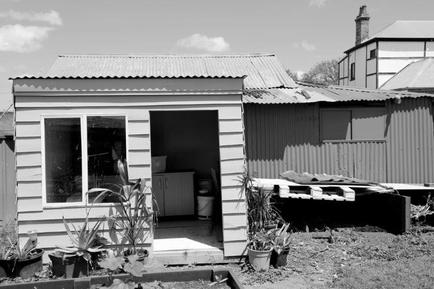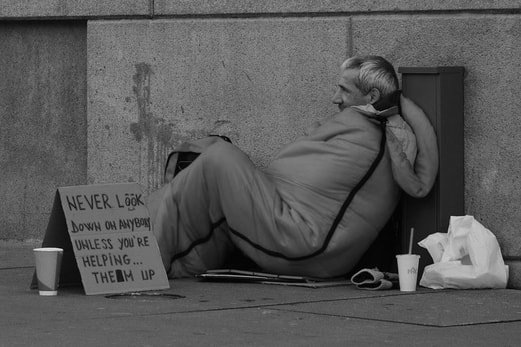|
Elizabeth Berger's story is reported below by Maree. Press play on the audio to hear Elizabeth tell part of her story
|

A Fighting Spirit
by Maree Gallop
Elizabeth peered through the grimy car windows at a woman, a man and three children crammed amongst crumpled laundry, shoes, books, pillows and other household items. She listened to the stranger’s story – how her family had led a comfortable life until her husband was made redundant, triggering a previous mental illness, and she suffered a heart attack. They were depleted of all personal resources and now living in their car.
The woman held Elizabeth’s hand and walked with her on a journey that changed both their lives. The children were enrolled in the school and Elizabeth used her knowledge and connections to house the family who regained a meaningful life in the community where they belonged.
Elizabeth has heard many similar stories since then. At an age of retirement, when most people think about relaxing, Elizabeth shares her skills and wisdom through a charitable organisation she initiated. She creatively helps others obtain fundamental human rights: water, food, shelter and a home, by leasing old hotels (with the generous help of others).
In an old pub in Maitland known as Darcy’s Place, there’s the bang of a hammer, the whir of a drill and the smell of roast beef cooking in the oven. Men and couples, once homeless, work together, honing skills and building a comfortable home environment, and a sense of purpose and worth. They model the fighting spirit of Maitland hero and Australian Boxer, Les Darcy, who fought all his fights in the pub’s back yard. There’s a vegetable garden in the shape of a boxing ring as a reminder that we can all fight and champion our own cause.
On the surface, the story of a school counsellor/social worker helping others sounds reasonable. Christian values certainly play a part in Elizabeth’s mission, but her own story of homelessness may be a vital ingredient in the home grown recipe that she brings to the table when considering the needs of others.
When Elizabeth was a child she was raised in a family with a father on sickness benefits and a mother who didn’t work. Her father gambled what money they had on poker machines. They relocated to Newcastle and lived in a shed on a friend’s farm with no help from the government. Elizabeth recalls, “there was nothing around in those days,” save the generosity and kindness of family and friends.
At the age of twenty-one, Elizabeth was married to a violent man. “He beat the shit out of me. Broke teeth, ribs, cigarette burns . . . .” When the relationship ended, she turned her back on bitterness and chose to give love to the community instead.
“I can connect with people doing it tough. I’ll act as a mentor. I don’t believe in taking all my skills to the dirt.”
There’s something visceral in Elizabeth’s voice. The knowledge she carries goes beyond the academic and theoretical; her personal experience is woven through the fabric of her being and guides her vision and actions.
Some argue that Elizabeth’s approach to providing dormitory style accommodation is out-dated but she’s sceptical about the current housing solutions supported by governments and other agencies. She’s seen governments come and go, projects fizzle and money dry up. Her faith remains in restoring old hotels with a dream to lease five across the Hunter, located on the train line to ensure access to services.
Elizabeth knows first-hand the barriers to accessing services and the risk of isolation. Her plan to bring free services together in one place and provide creative spaces for activities such as yoga, exercise, parenting programmes, cooking, shared meals, computer lessons, legal and medical services, all promote a holistic approach.
Whilst Elizabeth’s vision to help many groups of people who are homeless may seem grandiose, she believes, “given the opportunity, most people will do the right thing. Everything in the Maitland hotel is donated … money, a commercial kitchen, pots and pans, crockery, tables, chairs, coffee machine, shipping container, refrigeration, six computers …”.
Elizabeth’s mission continues in the knowledge that “the poor will always be with us”, but “there’s more than enough for us all to share. We can do the most compassionate thing We can! In any moment, if your heart gets twanged, let it sing. We all get the call but not all of us act.”
by Maree Gallop
Elizabeth peered through the grimy car windows at a woman, a man and three children crammed amongst crumpled laundry, shoes, books, pillows and other household items. She listened to the stranger’s story – how her family had led a comfortable life until her husband was made redundant, triggering a previous mental illness, and she suffered a heart attack. They were depleted of all personal resources and now living in their car.
The woman held Elizabeth’s hand and walked with her on a journey that changed both their lives. The children were enrolled in the school and Elizabeth used her knowledge and connections to house the family who regained a meaningful life in the community where they belonged.
Elizabeth has heard many similar stories since then. At an age of retirement, when most people think about relaxing, Elizabeth shares her skills and wisdom through a charitable organisation she initiated. She creatively helps others obtain fundamental human rights: water, food, shelter and a home, by leasing old hotels (with the generous help of others).
In an old pub in Maitland known as Darcy’s Place, there’s the bang of a hammer, the whir of a drill and the smell of roast beef cooking in the oven. Men and couples, once homeless, work together, honing skills and building a comfortable home environment, and a sense of purpose and worth. They model the fighting spirit of Maitland hero and Australian Boxer, Les Darcy, who fought all his fights in the pub’s back yard. There’s a vegetable garden in the shape of a boxing ring as a reminder that we can all fight and champion our own cause.
On the surface, the story of a school counsellor/social worker helping others sounds reasonable. Christian values certainly play a part in Elizabeth’s mission, but her own story of homelessness may be a vital ingredient in the home grown recipe that she brings to the table when considering the needs of others.
When Elizabeth was a child she was raised in a family with a father on sickness benefits and a mother who didn’t work. Her father gambled what money they had on poker machines. They relocated to Newcastle and lived in a shed on a friend’s farm with no help from the government. Elizabeth recalls, “there was nothing around in those days,” save the generosity and kindness of family and friends.
At the age of twenty-one, Elizabeth was married to a violent man. “He beat the shit out of me. Broke teeth, ribs, cigarette burns . . . .” When the relationship ended, she turned her back on bitterness and chose to give love to the community instead.
“I can connect with people doing it tough. I’ll act as a mentor. I don’t believe in taking all my skills to the dirt.”
There’s something visceral in Elizabeth’s voice. The knowledge she carries goes beyond the academic and theoretical; her personal experience is woven through the fabric of her being and guides her vision and actions.
Some argue that Elizabeth’s approach to providing dormitory style accommodation is out-dated but she’s sceptical about the current housing solutions supported by governments and other agencies. She’s seen governments come and go, projects fizzle and money dry up. Her faith remains in restoring old hotels with a dream to lease five across the Hunter, located on the train line to ensure access to services.
Elizabeth knows first-hand the barriers to accessing services and the risk of isolation. Her plan to bring free services together in one place and provide creative spaces for activities such as yoga, exercise, parenting programmes, cooking, shared meals, computer lessons, legal and medical services, all promote a holistic approach.
Whilst Elizabeth’s vision to help many groups of people who are homeless may seem grandiose, she believes, “given the opportunity, most people will do the right thing. Everything in the Maitland hotel is donated … money, a commercial kitchen, pots and pans, crockery, tables, chairs, coffee machine, shipping container, refrigeration, six computers …”.
Elizabeth’s mission continues in the knowledge that “the poor will always be with us”, but “there’s more than enough for us all to share. We can do the most compassionate thing We can! In any moment, if your heart gets twanged, let it sing. We all get the call but not all of us act.”

